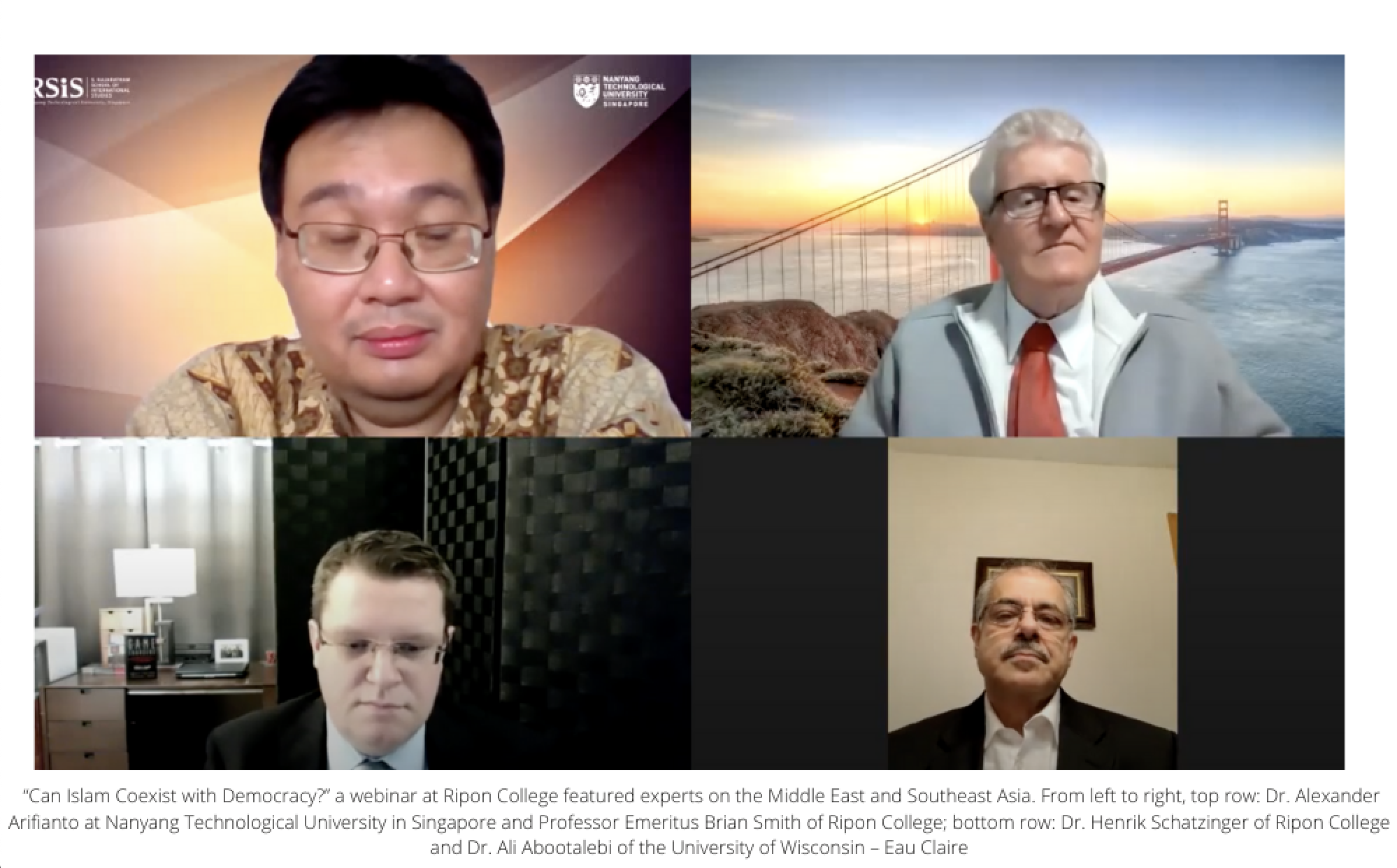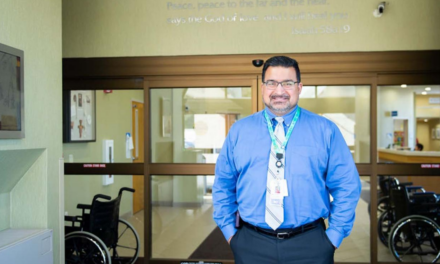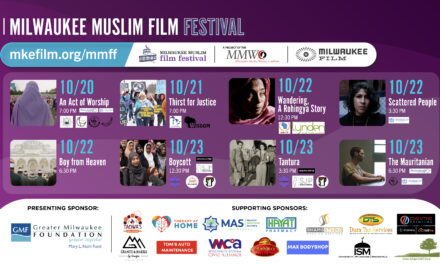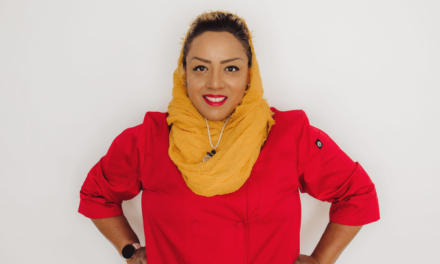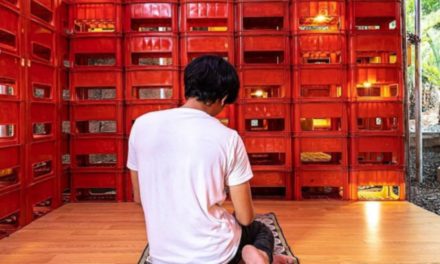Photo©:
Ripon College, University of Wisconsin-Eau Claire, RSiS & Huff Post
“Americans do not often receive accurate information about Islam in the media or how it interacts with political systems in majority Muslim countries,” Ripon College Professor Emeritus Brian Smith noted at the opening of a recent webinar “Can Islam coexist with democracy?”
“Their common impression is that the Islamic religion promotes authoritarianism and violence and that it is incompatible with human rights and representative forms of government,” he continued. “There is little understanding that the problems in these majority Muslim countries come from the political culture rather than from the religion.”
Ripon College’s Center for Politics and the People brought together experts on the Middle East and Southeast Asia in February to discuss the political, cultural and socio-economic dynamism of political Islam in Muslim-majority countries to explain “the complex web of variables central to understanding Islam and Islamism and the realization of political democracy and development,” the center’s website said.
Dr. Ali Abootalebi, a professor of political science at the University of Wisconsin-Eau Claire, has written extensively on Islam and government, Iran and the Middle East. Dr. Alexander Arifianto, a graduate of Ripon College, is now a research fellow with the Indonesia Programme, S. Rajaratnam School of International Studies (RSIS) – Nanyang Technological University, Singapore. His research interests are political Islam and contemporary Indonesian politics.
Smith and his colleague, Dr. Henrik Schatzinger, an associate professor of politics and government at Ripon College, moderated the discussion on the relationship of Islam and democracy in the contemporary global society. The two serve as co-directors of the Center for Politics and the People.
“Many Americans are also not aware that there are majority Muslim countries today where hospitable relationships do exist and have for some time between democratic governments and Muslim religious leaders and followers,” Smith noted. That is why they decided to host this panel, he said.
Democracy is a process
In his remarks, Dr. Abootalebi noted that what we call democracy in the West is the product of 600 years of development. “Democracy took centuries to develop. It is a never-ending process.
“In this process, we initially had the absolutist states in Europe. It was not until about 1648 and the beginning of the rise of the modern state, then later the French revolution and even after that we saw the rise of Napoleon, not democracy. Later we had the American revolution, and going through the expansion of democracy into the 20th century. Eventually, in 1920 the United States gave women the right to vote (in France it was after WWII). Democracy in the 1900s is a far cry from democracy today.

Dr. Ali Abootalebi
“Similarly, in the Middle East, we saw a lot of decolonization after WWII and in Arab countries and Iran, we saw the initial flirting with the creation of states, where you have to create a federal nation between tribal groups. That’s a tall order.
“In the process, the state accumulated a lot of power because it has the military and the bureaucracy. That is where you see in a lot of Arab states, the state has become a cash cow, a way for the elite to enrich themselves. In developing countries, we see lopsided relationships, where society is at the mercy of the state. We see power with the elite at the expense of the people.”
He also noted that even though we talk about the separation of “church and state” in the U.S., “politics and religion always interact. You have issues like abortion and minority rights that remain important issues still today.”
There is always a competition for power between state and society and within state and society. When we have a balance, we have a political system that is more or less democratic, he explained.
Prerequisites for a hospitable relationship between Islam and Democracy
Smith asked Abootalebi to identify what is needed for a democracy to have a hospitable relationship with Islam and the professor offered a list:
- The rule of law. That should be paramount.
- Primacy of a constitution; agreeing upon principles.
- Cooperation or you may not resolve the initial differences.
- Presence of political institutions.
- Accountability, transparency and meritocracy.
- A certain level of economic development.
- Civil society, a society that is organized in groups, associations, clubs, etc. to counterbalance the power of the state.
“Once you have these things, you could introduce elements of religion,” he said.
“When it comes to Islam, at least we have to understand the basics of what it is. Islam is a way of life. It is not just a matter of politics or economic society or a belief system. You have to talk about whose Islam you are talking about? Islam of the masses? Of the clerics? Of the philosophers? Modernists? Traditionalists? Fundamentalists?
“When it comes to the question of Islam and democracy, let’s not put all 57 Muslim-majority countries in one basket,” Abootalebi said. “A democracy can be a hospitable place for Islam provided that the Muslim leaders can adjust themselves to the norms and values and structures of democracy.
“Also, let’s be careful about the causes of authoritarianism in the Islamic world. Most of us here would argue that the causes are structural – economic, social, political – and have little to do with Islam.”

Dr. Alexander Arifianto
A long period of inclusion is important
Dr. Arifianto pointed to the inclusion of religious and other societal groups in politics as critical for a Muslim-majority society to be a democracy.
“Healthy and diverse civil society associations, whether secular or religious, politically active or not, and a philosophy that allows all these groups to interact and check the power of the ruler, whether the ruler is secular or religious is key,” he said. He pointed to Indonesia as an example of a society that has included Muslim political parties in politics since the country declared independence in 1945.
“That leads to my second point,” he said. “The importance of inclusion which allows Islamic associations to have influence and, in the process, they become moderate players.
“The thing that distinguishes the Indonesia experience from other Muslim countries, we have never had a sense of state secularity where the state is completely secular and Muslim groups are excluded from politics. In Indonesia, Muslim associations have always been part of Indonesian politics. This is the secret why Indonesia has become a model democracy since the fall of authoritarian rule in 1990.”
Does American foreign policy hinder the democratization
Arifianto said he would like to see “the Biden administration return to the policy of the Obama administration to engage with the Muslim majority nations and to treat them as potential partners of the United States instead of a potentially hostile element.”
He added that most Muslim majority nations want a fair solution to the Israeli-Palestinian conflict. “Unfortunately, over the past four years, with encouragement from the Trump administration, the Israeli regime has absorbed more of the voice of the Palestinians and has further marginalized them.
“The Biden administration needs to persuade the Israelis to go back to the negotiating table with the Palestinian authority to have a two-state solution. This is the number one concern of the vast majority of Muslim majority nations. And the second issue would be how to resolve the Iranian nuclear deal.”
Abootalebi is ”of the opinion that the U.S. foreign policy has fundamentally played a negative role in many countries, including the countries in the Middle East. In post-WWII, it was a three-tier policy: anti-communism and containment of communism, internationalism and support for the state of Israel, and stability over democracy. The United States policy was never interested in democracy in the Middle East.”
Back in America
“We have a way to go in this country in terms of being inclusive to all groups,” Smith said. “We have a way to go before we can convince some Americans that an authoritarian overthrow of our government is not the way to improve it.
“We all need to learn from our own experience and the experiences of other countries about what it means to work on democracy.”
See the entire program here.
